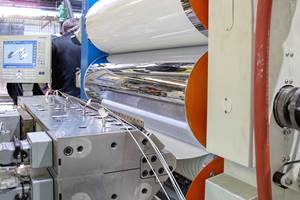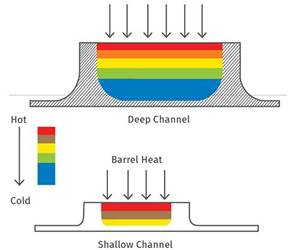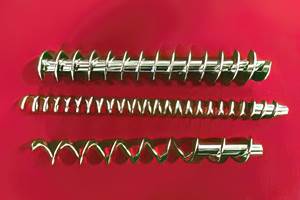Plastics Training Enters Virtual Reality
Plastics processors are discovering two employee training programs initiated this year that offer instruction in a “virtual” space, where the student can interact with the instructor and course materials via a satellite dish or the internet.
Plastics processors are discovering two employee training programs initiated this year that offer instruction in a “virtual” space, where the student can interact with the instructor and course materials via a satellite dish or the internet. These new training resources are the Plastics Learning Network (PLN), a program of the Society of the Plastics Industry (SPI) in Washington, D.C., and Nypro On-Line from Nypro Inc., Clinton, Mass., a custom injection molder that has developed an extensive curriculum of training courses over the past 23 years.
Televised training
Live interactive class sessions offered by the Plastics Learning Network are now available via 18 satellite downlinks to students in six states (Florida, Georgia, Kentucky, New Hampshire, South Carolina, and Wisconsin). SPI’s “distance learning” program ended its pilot phase at the start of this year and is now up and running commercially, says Richard Sturgis, director of SPI’s Southern Region. Two courses (Preparation for Injection Molding, and Preparation for Extrusion) provide training for SPI’s National Certification in Plastics exam (which is also available on the internet). The certification exam assesses workers’ understanding of machine operations, maintenance, troubleshooting, basic safety procedures, quality assurance, and other critical skills. Course content comes from the Polymers Center of Excellence, an independent, nonprofit, state-funded service organization in Charlotte, N.C.
Plastics processors in Florida are eligible for state funds to support worker training, including payment for PLN courses. Lucia Fishburne, manager of WorkForce Florida Inc., the state agency for workforce development, says it has allocated $189,700 for plastics training out of $2.8 million available to spend on training programs.
Custom injection molder Precise Technology Inc. has 40 employees at its St. Petersburg, Fla., plant enrolled in a PLN certification course. State funds cover the cost, which amounts to $700 per person, or $28,000. The company could afford to enroll only a mere handful of workers if it had to pay out of its own pocket, says plant manager David Outlaw. The course is voluntary, so workers are motivated by the goal of bettering themselves, not company requirement. As a result, “There are no fears about passing or failing. This makes the worker more confident,” Outlaw says. The 28-hour course is held for two hours a day, two days a week, for seven weeks. The PLN training supplements Precise Technology’s own training program.
Because WorkForce Florida could not find suitable space at a college or university to conduct the PLN classes, Precise Technology volunteered a room at its plant and invited employees from other companies to attend. (As a result, Precise receives a “downlink rebate”—available to all downlink sites for providing the space and equipment—of $170 per student.) Twenty additional students from other Florida plastics firms attend PLN classes at Precise. They also have their tuition paid by the state.
Internet University
Nypro has long made its training courses available to workers from other molding firms. Employees of other molders have made up half the class taking courses in plastics developed by Nypro and taught at the Nypro Institute at Fitchburg College in Fitchburg, Mass. The brand-new internet courses are even more widely available and count for credit toward a Bachelor of Science degree at the University of Massachusetts at Lowell. The four courses, adapted for the internet with the help of Lowell faculty, are Basic Injection Molding, Introduction to Mold Design, Commodity Thermoplastics, and Engineering Thermoplastics.
“There are many firms not located near a center of plastics expertise such as Lowell or near a school or training center. This is one way to serve them,” says Dick Hermann, Nypro’s corporate director of training and organizational development. He notes that internet course work can be accessed at any time. This also allows students to start the course at any time and proceed at their own pace. While students cannot interact with instructors in real time, they can post questions for instructors to answer.
Through its new partnership with Lowell, Nypro develops the course content and Lowell professors evaluate and approve it. The university is also creating courses that will be added to the internet program. Nypro says around 200 students are already involved in the on-line program. The courses cost approximately $600 per person.
Related Content
Roll Cooling: Understand the Three Heat-Transfer Processes
Designing cooling rolls is complex, tedious and requires a lot of inputs. Getting it wrong may have a dramatic impact on productivity.
Read MoreThe Importance of Barrel Heat and Melt Temperature
Barrel temperature may impact melting in the case of very small extruders running very slowly. Otherwise, melting is mainly the result of shear heating of the polymer.
Read MoreWhat to Know About Your Materials When Choosing a Feeder
Feeder performance is crucial to operating extrusion and compounding lines. And consistent, reliable feeding depends in large part on selecting a feeder compatible with the materials and additives you intend to process. Follow these tips to analyze your feeder requirements.
Read MoreHow To Identify Resin Degradation in Single-Screw Extruders
Degradation can occur in many single-screw extrusion operations, and typically occurs due to minor design flaws in the screw. Here is how to track it down.
Read MoreRead Next
Lead the Conversation, Change the Conversation
Coverage of single-use plastics can be both misleading and demoralizing. Here are 10 tips for changing the perception of the plastics industry at your company and in your community.
Read MorePeople 4.0 – How to Get Buy-In from Your Staff for Industry 4.0 Systems
Implementing a production monitoring system as the foundation of a ‘smart factory’ is about integrating people with new technology as much as it is about integrating machines and computers. Here are tips from a company that has gone through the process.
Read MoreSee Recyclers Close the Loop on Trade Show Production Scrap at NPE2024
A collaboration between show organizer PLASTICS, recycler CPR and size reduction experts WEIMA and Conair recovered and recycled all production scrap at NPE2024.
Read More











